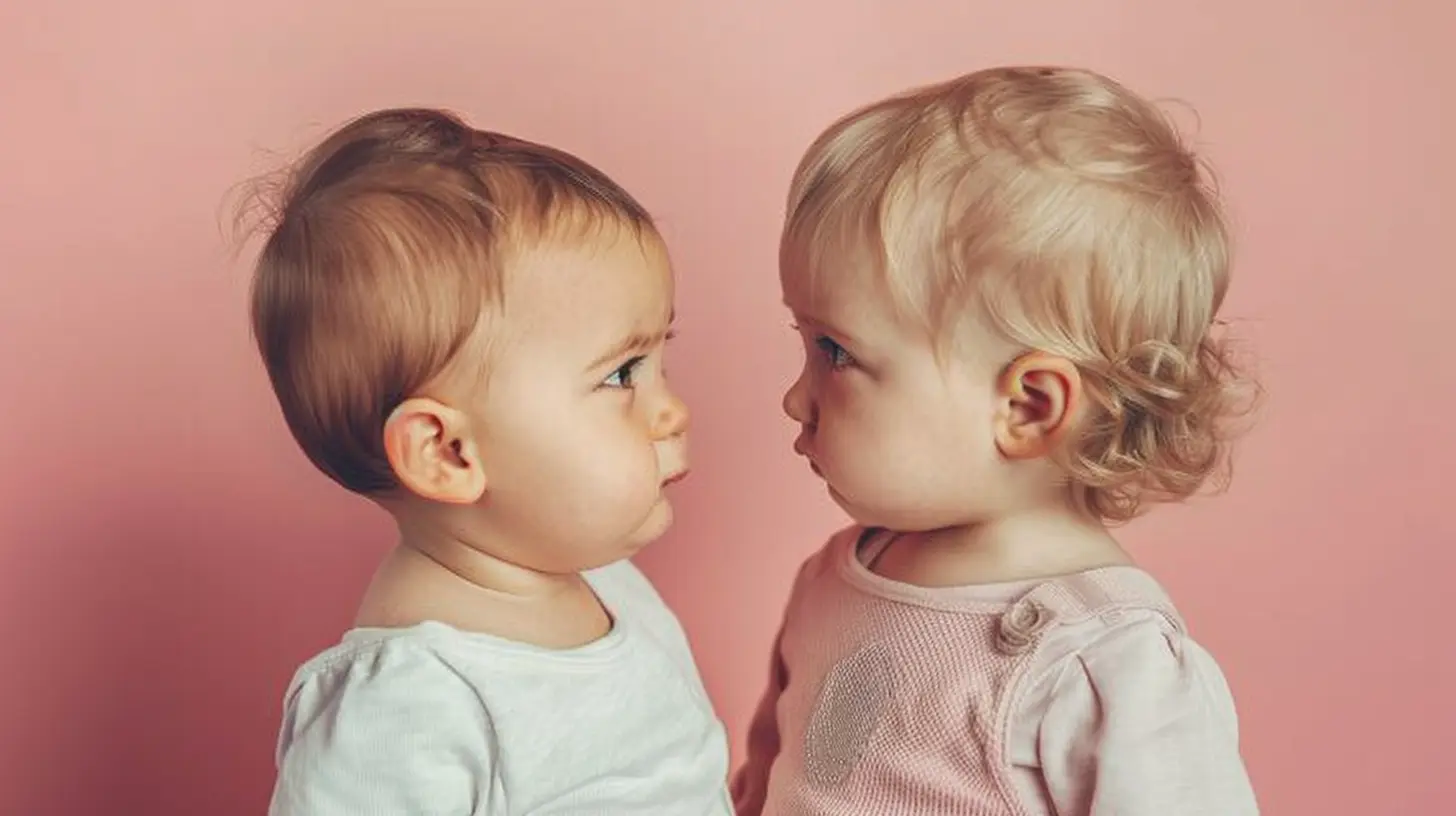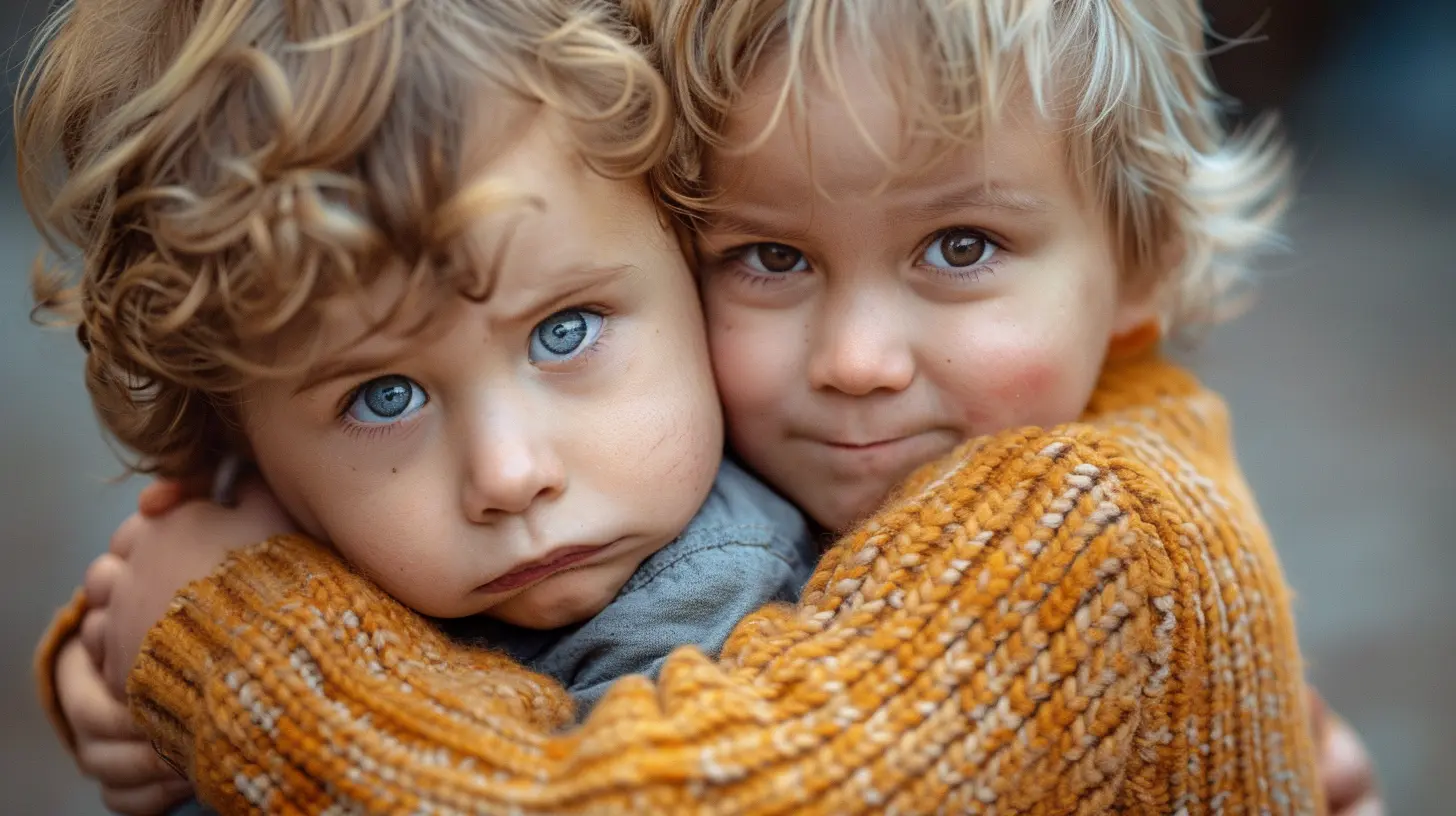Managing Jealousy in Siblings with Big Age Gaps
19 December 2024
Sibling relationships are a special blend of love, rivalry, and (sometimes) a bit of jealousy. But when there's a significant age gap between siblings, managing jealousy can feel even trickier. As a parent, it’s natural to want your children to get along like peanut butter and jelly, but that’s not always the case, especially when there's a large difference in their ages. So, how do you create harmony in a household when one child is well into their teen years and the other is still figuring out how to tie their shoes?
In this article, we'll dive into how to manage jealousy between siblings when there's a substantial age difference, and ways to foster a positive, loving relationship between them despite that gap. Spoiler alert: It’s going to take a bit of patience, understanding, and a touch of creativity!
Understanding the Source of Jealousy
Jealousy between siblings isn't uncommon, regardless of age gaps. But when there’s a significant difference in years, the dynamics change. The older sibling might feel territorial or even resentful of the attention the younger one garners, while the younger sibling might feel left out or inadequate compared to their older, more independent counterpart.But the important question is: Where does this jealousy come from?
1. The Firstborn’s Transition from Only Child to Big Sibling
When you have an older child—especially one who’s used to having you all to themselves for several years—introducing a new baby can shake their world. Suddenly, the attention they were accustomed to is divided, and for a child who’s used to being the “star of the show,” that can feel unsettling.Imagine being the only performer on stage, and then suddenly, a co-star appears. It's a major adjustment!
They might struggle with the shift, particularly if they've been the sole focus of your love and attention for a long time. This is often referred to as “dethronement.”
The feelings of jealousy can stem from:
- Attention-sharing struggles: The older sibling may feel neglected or less important.
- Changing roles: Now they’re expected to be the “big” sibling, which is a role they didn’t ask for.
- Competing needs: While the baby requires constant attention because of their age, the older sibling’s needs could be overshadowed.
2. The Younger Sibling’s Desire to ‘Catch Up’
Younger siblings with much-older brothers or sisters often look at them as role models. The younger child might feel jealous of the freedoms, capabilities, or privileges their older sibling enjoys. They might feel exasperated, wondering, "When will I be old enough to stay up late?" or "Why does my sibling get to hang out with friends while I can’t?"To the younger child, it might seem like daily life is an endless waiting line to reach the privileges of the older sibling.
Strategies to Manage Sibling Jealousy
Sibling rivalry and jealousy are natural, but they don’t have to dominate the household. Here’s how you can help reduce jealousy and nurture a healthy relationship between your children with a big age gap.1. Set Realistic Expectations for Both Kids
It’s easy, as a parent, to expect the older sibling to act responsibly or patiently just because they’re older. But we have to remember—they're still kids, too! Sure, they’re more mature than a toddler or a preschooler, but they're still growing emotionally and mentally.Tip: Avoid overburdening the older child with responsibilities. Don’t assume that just because they’re older, they have to always “be the bigger person” or take care of their younger sibling. Yes, there’s some truth to growing up with those duties, but remember that they're children as well.
On the flip side, expect your younger child to act their age too. There’s no rush for them to “catch up” to their sibling. Emphasize that it’s okay for them to be different and to be in different life stages.2. Create One-on-One Time with Each Child
Here's the deal—every child craves attention, no matter their age. One key element in managing sibling jealousy is ensuring both kids feel individually important.Carve out special moments where you spend time with each child one-on-one. Whether it’s grabbing an ice cream cone with your teen or reading a bedtime story to your little one, these personal interactions go a long way in making both children feel seen and valued. It assures them that their connection with you isn’t reliant on their sibling being around.
Pro Tip:
- Try establishing a “mom/dad date” with each child—maybe once a week or once a month—where it’s just you and them. No distractions. No interruptions. Just pure, undivided attention.3. Empower the Older Sibling—But Don’t Make Them the Parent
Older siblings often feel like they’ve been given an unofficial promotion to “mini-parent.” And while it’s nice when the older sibling wants to help (or when you ask them to pitch in), making them feel responsible for their sibling’s well-being can foster resentment.Instead, empower them by acknowledging their role as a role model, not as a second parent. Encourage them to teach their younger sibling things they’ve mastered—like how to ride a bike or bake cookies—but leave the heavy-lifting of discipline and caregiving to you.
This way, the older sibling feels respected and important without feeling burdened by parenting duties they didn’t sign up for!
4. Highlight the Benefits of Their Unique Bond
Kids, no matter their age gap, have something in common: They’re siblings! It's your job to remind them of the unique and irreplaceable bond they share.Talk about how their age difference gives them advantages. For instance, if you have a teenager and a toddler, the older sibling gets the perk of being a mentor and teaching their sibling things, while the younger sibling gets the benefit of learning from someone who’s been through the same stages.
You might even consider creating traditions or adventures that emphasize the specialness of their specific relationship. Maybe the older sibling can “take charge” of something fun every week, like movie night or building a Lego city, giving them an active role in fostering a positive connection.
5. Acknowledge and Validate Their Feelings
A major part of jealousy management is simply recognizing emotions. Both your older and younger child might be feeling jealousy, and when those feelings aren’t addressed, they can bubble over into anger, frustration, or isolation.When your child expresses jealousy (or acts out because of it), try not to dismiss their feelings. Instead, validate them. Say something like, “I can understand why you might feel jealous of your sister. You’re not wrong to feel that way, but let’s talk about it.”
By acknowledging their emotions, you're opening the door for communication rather than fostering resentment.
6. Encourage Individuality
A quick way to diminish jealousy between siblings is to celebrate what makes each child unique.Does your teenager love painting? Praise their creativity while acknowledging that maybe your younger child is great at solving puzzles.
Fostering individuality prevents the kids from feeling like they’re in competition with one another. Instead, they see themselves as belonging to Team Family—where everyone brings something special to the table.
One way to encourage individuality is by designating spaces or activities for each child based on their interests. Maybe your teen gets a quiet corner for studying or painting, while your younger child has a dedicated toy area.
When to Seek Extra Help
Sometimes, no matter how hard you try, sibling jealousy can get out of hand. If the jealousy morphs into aggression or consistently toxic behavior, it might be time to seek external help.Maybe speaking to a family therapist or counselor would help your children understand their emotions better and give them tools to cope. Professional guidance can often provide an objective take on the situation and suggest strategies that you might not have considered.
Building a Sibling Bond that Lasts
In the end, remember that the sibling relationship is one of the most long-lasting connections your children will ever have. Even if they occasionally feel jealous of one another, with your guidance, they can learn to navigate those feelings and create a lifelong bond based on respect and love.While having a big age gap can introduce different challenges, it also opens up unique opportunities for deep connections. Your job, as always, is to help foster peace, nurture individual strengths, and watch their sibling bond grow stronger by the day.
Because at the end of the day, isn't that what every parent hopes for—a harmonious family dynamic where their children not only love but like each other?
all images in this post were generated using AI tools
Category:
Sibling JealousyAuthor:

Austin Wilcox
Discussion
rate this article
15 comments
Marley Frye
Age gap? More like a time warp of sibling rivalry!
February 5, 2025 at 4:09 PM

Austin Wilcox
That's a clever observation! Age gaps can certainly create unique dynamics that amplify sibling rivalry.
Wolf Snow
Embrace the unique bond that comes with age gaps! By fostering understanding and encouraging teamwork, you can turn jealousy into a beautiful opportunity for growth and connection among siblings.
February 1, 2025 at 4:07 PM

Austin Wilcox
Thank you for your thoughtful comment! Embracing age gaps can indeed foster understanding and deeper connections among siblings, transforming jealousy into opportunities for growth.
Elle McFadden
Addressing sibling jealousy requires open communication, validation of feelings, and intentional bonding activities to strengthen their relationship despite age differences.
January 28, 2025 at 5:19 PM

Austin Wilcox
Thank you for your insightful comment! Open communication and intentional bonding are indeed key to fostering a positive sibling relationship, especially with age differences.
Cadence Perez
Oh, managing sibling jealousy with big age gaps? Sounds like a walk in the park—if that park were overrun with wild animals! Just wait for the day when your toddler is jealous of your teenager’s ability to roll their eyes perfectly. Parenting bliss at its finest, right? Good luck!
January 26, 2025 at 5:57 AM

Austin Wilcox
Thanks for the laugh! It definitely feels like a wild adventure, but I’m here for the challenge. Appreciate your good wishes!
Katalina McLaughlin
Great insights on managing sibling jealousy! Encouraging individual quality time with each child can really help, along with promoting teamwork through fun activities that highlight their unique strengths. Open conversations about feelings also foster understanding. Thanks for sharing these strategies; they’re a fantastic resource for parents navigating this challenge!
January 21, 2025 at 4:56 AM

Austin Wilcox
Thank you for your thoughtful feedback! I'm glad you found the strategies helpful for fostering sibling harmony.
Amalia Lee
Managing sibling jealousy with big age gaps? Just remember, the older one can be a built-in babysitter and the younger one can steal their snacks—perfect balance!
January 18, 2025 at 5:46 AM

Austin Wilcox
Thanks for your humorous take! Balancing roles can definitely help ease sibling rivalry while fostering positive relationships.
Damien Hernandez
This article offers such valuable insights! I’m eager to learn new strategies for fostering harmony between my kids despite their age differences. Excited to explore these ideas further!
January 16, 2025 at 4:50 AM

Austin Wilcox
Thank you for your enthusiasm! I'm glad you found the insights valuable. Exploring strategies for fostering harmony is key, and I hope you find the ideas helpful!
Margaret Simon
Embrace the beauty of each sibling's unique journey! By fostering open communication and celebrating individual strengths, you can transform jealousy into a powerful bond, nurturing love that transcends age differences. Together, stronger!
January 12, 2025 at 4:33 AM

Austin Wilcox
Absolutely! Embracing individuality and promoting open communication are key to nurturing strong, loving sibling relationships, regardless of age gaps. Together, we can turn jealousy into connection!
Shannon Duffy
Interesting perspective! Excited to try these tips with my kids!
January 6, 2025 at 4:53 AM

Austin Wilcox
Thank you! I'm glad you found it helpful—hope your kids enjoy the tips!
Inez McAdoo
Great tips! Managing jealousy between siblings can be tricky, especially with age gaps. It’s all about communication and finding ways to bond—every little moment counts in building those connections!
January 1, 2025 at 5:37 AM

Austin Wilcox
Thank you! I'm glad you found the tips helpful. Communication and bonding truly are key in fostering strong sibling relationships, regardless of age differences.
Emma Pacheco
Age gaps can deepen bonds, not jealousy.
December 27, 2024 at 3:39 AM

Austin Wilcox
Thank you for your insight! Age gaps can indeed foster unique connections, allowing siblings to learn from each other in meaningful ways.
Rhiannon O'Neal
Great tips! Encouraging one-on-one bonding time, celebrating each child's individuality, and fostering open communication can truly help manage jealousy. It’s essential to remind them of the unique strengths each sibling brings!
December 23, 2024 at 4:07 AM

Austin Wilcox
Thank you for your insights! Celebrating individuality and fostering open communication are key strategies in nurturing healthy sibling relationships, especially with age gaps.
Lacey McAllister
Navigating sibling jealousy in families with significant age gaps requires intentional communication and bonding activities. Encouraging shared interests can foster connection, while also recognizing each child's individual needs helps to mitigate feelings of insecurity and rivalry. Empathy is key.
December 21, 2024 at 5:27 PM

Austin Wilcox
Thank you for your insightful comment! I completely agree that intentional communication and empathy are crucial in fostering healthy relationships between siblings with significant age gaps.
Nellie Mitchell
Thank you for this insightful article! It offers valuable strategies for navigating sibling dynamics, especially with age gaps. I appreciate the tips on fostering understanding and connection between siblings. Looking forward to implementing these ideas!
December 20, 2024 at 3:18 PM

Austin Wilcox
Thank you for your kind words! I'm glad you found the strategies helpful. Best of luck implementing them!
Clementine Rios
Navigating sibling jealousy can be challenging, especially with age gaps. Remember, fostering unique bonds and celebrating individual achievements can help. Encourage open communication and empathy, allowing each child to feel valued. Your efforts will strengthen their relationship and create lasting harmony.
December 19, 2024 at 3:43 PM

Austin Wilcox
Thank you for your insightful comment! Fostering unique bonds and open communication is indeed key to managing sibling jealousy, especially with age differences. Your emphasis on empathy and valuing each child’s achievements is invaluable for nurturing harmonious relationships.
MORE POSTS

The Pitfalls of Comparing Your Child to Others

Building Emotional Resilience in Children Struggling With Anxiety

How to Report and Block Unwanted Contacts on Social Media Platforms

Family Bonding Through Teamwork: Doing Chores Together

Babies and Their Senses: Exploring Through Sound, Sight, and Touch

Encouraging Honest Expression of Feelings Between Siblings

Empowering Your Children to Solve Problems Together

First Friendships: Helping Your Toddler Socialize

The Dangers of Overpraising Your Kids

The Impact of Consistency in Discipline and How to Achieve It